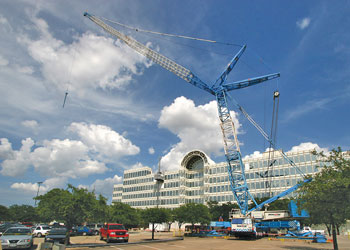|
|
SPECIAL ADVERTISING SECTION: CONSTRUCTION REPORT
From Site Selection magazine, January 2009
Beyond the
Corporate Resume by FRANK RENZLER & DAN BUSCH

T
he selection of a construction services provider that best meets your needs delves far deeper than resumes and corporate track records. Certainly, the cornerstone of any successful construction service relationship is the technical excellence of the builder. But leading firms today have sourcing departments and vetting protocols that are second to none, and standard qualifications are (usually) not the differentiators. The true delta is to select a construction service partner that supports your core mission and business goals. Doing so requires evaluating definable metrics as well as considering intangibles that a provider may or may not offer. It is in these details that one finds the value-added relationships demanded by today?s business environment. Getting to Know You
You do not provide your clients with a one-size-fits-all product or service. Should you accept it from those serving you? A construction service provider that will adapt to your strategic business model will answer with a resounding ?No!? To meet owners? needs today, it is critically important for builders to know their clients? business cultures: How are success and risk defined? What are key performance indicators (KPI)? How are decisions made within the organization? By understanding these drivers, the builder can better mirror its client and tailor its services. For example, if key budget and organizational decisions happen at quarterly meetings, the builder can develop project schedules more relevant to the owner?s business model to ensure that timely decisions are realized. Also, overall knowledge of an owner?s business sector, its trends and keys to success is a significant intangible of construction providers. In hotel construction, a paramount concern is the schedule, so that revenue-generating rooms are in service in the shortest time possible. The contractor must have the market power to provide quality subcontractors who can meet these mandates while achieving the superior level of quality and craftsmanship demanded for guest properties. After all, the construction is a reflection of your brand. Who?s Got Your Back?
Risk comes in many shapes and sizes. Anticipating risk and having strategies and resources in place to mitigate it is one of the top differentiators among leading construction service providers. Risk management begins with the stability and performance record of the contractor, largely reflected in the firm?s bonding capacity and financial conditions. Additional discriminators are debt the firm carries, ownership structure (public or private), and access to the firm?s (certified) balance sheets. These are measurable, directly comparable attributes that, combined with the clarity and transparency of a builder?s response, are strong indicators of an organization?s strength and willingness to partner with you. Another variable that sets a top-tier contractor apart is its approach to subcontractor and supplier risk management. Many firms tout prequalification and vetting. But evaluate if the contractor?s prequalification steps are enough in the current business climate. Today, due diligence requires more than reviewing bank statements and reputation. Prime contractors must understand all the contractual obligations of a sub/supplier vis-à -vis that firm?s resources. (Trouble on another project can quickly translate to trouble for you.) This information should be combined with analysis of financial, safety and surety KPIs such as credit line and history, cash flow, liquidity, EMR, OSHA citation history, legal claims and insurance coverage. Analysis and vetting should be applied with the same rigor to lower-tier subs/suppliers. Beyond prequalification, leading builders should have a comprehensive monitoring program in place. Warning signs that a sub/supplier may be in trouble include a change in its progress status on your project, expended labor hours not commensurate with completed scope, or a change in financial standing. The last step in comprehensive sub/supplier risk management is proactive performance failure contingency planning. Steps that top-echelon builders may take include: pre-selecting pre-qualified alternates, purchasing long lead items or warehousing materials and assigning them to subs/suppliers, securing lien waivers from both first- and lower-tier subcontractors, and obtaining assignment clauses for lower-tier subs/suppliers to assume the agreement in the event of a first-tier subcontractor failure. Lastly, consider a contractor?s ability and openness to offer creative insurance and bonding programs. This is a sign of both the surety market?s and the organization?s confidence in its strength and stability. For example, contractors with proven risk management tools are more likely to offer Contractor Controlled Insurance Programs (CCIP), even on large complex projects, thus benefiting owners through reduced insurance costs. Show Me the Money
If exceeding budget is a risk, does reducing it merit a reward? Leading builders think so, and use their supply chain purchasing power and market strength to achieve results for owners who demand best value while desiring predictability of outcomes. The supply chain is a volatile link in the process, except for the most accomplished, entrenched and stable construction firms. 
Top construction services providers have sophisticated estimating and preconstruction departments with fingers on the daily pulse of subcontractor/trade pricing and the costs of commodities and materials. These experts use their knowledge of ?right now? to leverage market conditions, do more with less and drive value. Additionally, top-tier contractors wield a unique combination of market power and technical expertise to achieve maximum benefit for customers. Leading builders will partner early in the project with the owner and its design team to help find ways to reduce costs. As materials are identified in the design phase, the contractor will work with manufacturers and suppliers to price the goods and/or troubleshoot production challenges, resulting in more accurate (predictable) budgets and schedules. Foremost construction service providers also have the ability to more directly manage subcontractors and suppliers – whether adding shifts, pre-purchasing production slots of long lead items or opening new manufacturing runs. Strength is in your favor. The Big Picture
In addition to these many unique capabilities, best-in-class builders are able to offer customers expertise that other providers cannot. These include skills such as LEED certification, BIM, technology management, site selection evaluation and building lifecycle analysis. Top contractors also embrace the team concept, recognizing that it is a cornerstone of success. Whether as simple as collegial collaboration, or more formal such as partnering or integrated project delivery (IPD), leading builders have proven performance across the spectrum of inclusive team approaches. Other key issues to consider when evaluating construction service providers include definable characteristics and some intangibles. Is your construction partner able (or willing) to participate as an investor or bring third-party investors to the table? What is the commitment from the highest levels of executive management, and can you really expect involvement by those individuals? Does the contractor?s corporate culture mirror yours? Does the firm possess demonstrable communications and presentation skills? Projects often require executive board and/or community review and approval, and your construction services provider should be as effective in the boardroom as he/she is at the site. Lastly, you and your selected provider should never forget that the performance and demeanor of the contactor you hire is a reflection of you. The Bottom Line
In the end, construction projects are not simply about erecting walls or installing sheet metal –they are about facilitating your organization?s core mission and goals. The question is: Which firm will take the time to understand, and then never lose sight of, your business objectives? Even in today?s extremely fluid and challenging business climate, anything can be accomplished with the right construction services provider. But, the difference between a simply pre-qualified contractor and a strategic partner is vast and can mean success or failure –not only of your project but your overall corporate mission. Frank Renzler (frank.renzler@structuretone.com) is executive vice president of global services for
|
|
©2009 Conway Data, Inc. All rights reserved. SiteNet data is from many sources and not warranted to be accurate or current.
|

